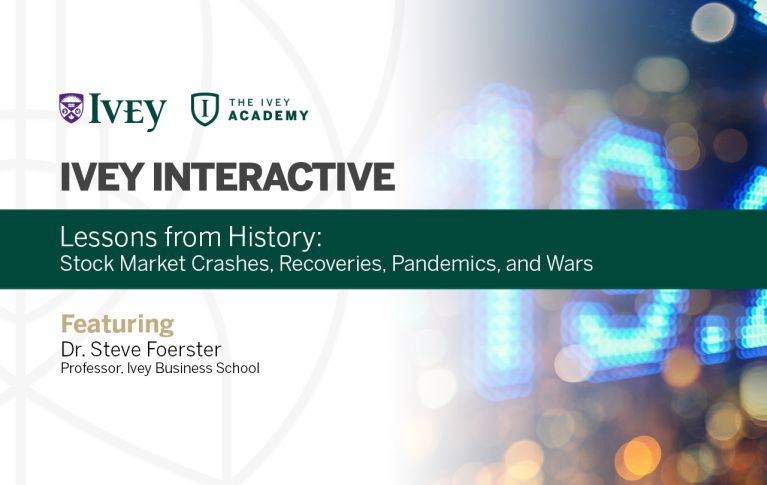Lessons from history: stock market crashes, recoveries, pandemics, and wars
In this video:
We are in unprecedented times. The human toll of the COVID-19 pandemic has been devastating. Trillions of dollars of investments have been wiped out, threatening retirement plans. Stock markets continue to gyrate. What’s next?
To answer that question, we can look to history to provide us with some guidance. On April 16, 2020, we delivered a complimentary webinar featuring Steve Foerster, a finance professor with capital markets expertise, to take a retrospective look at the past century’s U.S. stock market performance. Additionally, Steve investigated crashes and recoveries, long term stock market trends, market volatility, stock market performance during the 1918-1919 influenza pandemic, stock performance during recessions, and key lessons from history.
Key webinar content
Core topics
- A summarization of market sentiment
- Historical stock market performance
- Be cautious about staying out of the market during volatile times
- Is there a way to measure fear?
- Are we in a recession now? Should this be a concern as it relates to the stock market?
- The relationship between the stock market and the overall economy
- How do stocks perform during a recession?
- How does the current pandemic compare to the 1918-1919 influenza and SARS pandemics?
- Historical crashes and recoveries
- Are stocks cheap now?
- Should further market declines be expected?
- What is the relationship between the stock market and bond market?
Memorable quotes
“Pandemics and wars take a tragic human toll; not necessarily a long-term economic toll.” – Steve Foerster
"There is no easy money to be made. Be very cautious about getting out of the market during a volatile time because you might miss the major upswings." – Steve Foerster
Post-webinar Q&A with Steve Foerster
What's your take on using leverage to take advantage of buying opportunities in the stock markets?
Only take on the amount of risk you are comfortable with, that allows you to sleep at night. It’s not easy to identify what appear to be opportunities.
How predictable are pandemic-type events? Are you aware of any funds that have 'predicted' this event?
To quote Yogi Berra, “It's tough to make predictions, especially about the future.” If any fund manager predicted this, I’m not aware of it.
The period from the early 1970’s to 1990’s is a significant “slow” market period, characterized by debt and inflation. Are we not spending our way into a similar problem? We will have to pay somehow and likely in a way that affects returns. What do you think? Where would you invest (asset types and income options) to take advantage of your thesis?
That isn’t clear. There was a lot of spending after the Global Financial Crisis, that didn’t lead to high inflation. I wouldn’t “bet” on any one asset class.
I've avoided anything to do with the stock market my entire life as it felt "too complex." Incited by a friend's comment, "the stock market is on sale,", I decided to learn about it and maybe even jump in! What would you suggest to a novice to be informed and make good decisions about that "jump?"
I don’t like to give advice but… only jump-in if it’s for the long-term. Be diversified. Stay away from individual bets. Consider low-cost index funds.
Thoughts on diversification in this volatile landscape/future, perhaps assuming "more likely" scenarios? From industries to treasuries, real estate, gold, bitcoin, anything :)
Diversification is as important now as ever. That means across asset classes, and geographies. BTW, I’m not sure I would consider bitcoin an investment.
If you have a $100 today, what would you do and if you had to pick one specific stock, which one are you going to pick?
I wouldn’t pick a stock. I’d put it in a low-cost global stock index fund.
Given the potential impact to social and business norms from this pandemic, and massive financial stimulus and debt burden being incurred, is it fair to project similar consistent 8.5% annual returns in the future?
There were similar arguments around past pandemics, wars, and major crisis. Yet stocks have continued to offer consistent long-term returns.
Do you believe we have hit a bottom? Or do you believe the shape of the market will look like a ‘W’, like many analysts are projecting?
I don’t know. But I can say that, currently, market participants think the worst is over.
Additional Resources
Click the above image to view slides, or download the slide deck presentation.
Stocks for the long run, Jeremy J. Siegel
Common stocks as long term investments, Edgar Lawrence Smith
Note: This article was originally published under our former name, The Ivey Academy. We are now known as Ivey Executive Education.
About Ivey Executive Education
Ivey Executive Education is the home for executive Learning and Development (L&D) in Canada. It is Canada’s only full-service L&D house, blending Financial Times top-ranked university-based executive education with talent assessment, instructional design and strategy, and behaviour change sustainment.
Rooted in Ivey Business School’s real-world leadership approach, Ivey Executive Education is a place where professionals come to get better, to break old habits and establish new ones, to practice, to change, to obtain coaching and support, and to join a powerful peer network. For more learning insights and updates on our events and programming, follow us on LinkedIn.




 Give us a call 1.800.948.8548
Give us a call 1.800.948.8548




